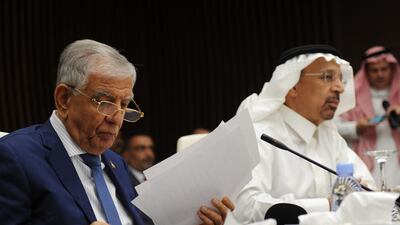Saudi Arabia's state budget deficit shrank by a fifth from a year earlier in the second quarter of this year as revenues rose moderately and spending fell marginally, finance ministry figures showed on Sunday.
Revenues increased 6 per cent from a year ago to 163.9 billion riyals (Dh160.59bn); oil revenues jumped 28 per cent to 101bn riyals because of higher international oil prices.
Spending dropped 1.3 per cent to 210.4bn riyals in the second quarter, leaving a deficit of 46.5 billion riyals compared to about 58.4bn riyals a year earlier.
Saudi officials said the figures showed the world's largest oil exporter was making good progress in repairing state finances that have been severely damaged by slumping oil prices in the last three years.
"Today's update presents clear evidence of progress towards achieving fiscal balance by 2020," said the finance minister Mohammed Al Jadaan.
"Whilst economic challenges remain, we are confident in achieving our fiscal deficit projections for 2017," he added. The government has projected a deficit of 198bn riyals or about 8 per cent of GDP this year, down from an actual 297 billion riyals in 2016.
Spending dropped 1.3 per cent to 210.4bn riyals in the second quarter because of a nearly 40 per cent fall in the government's "use of goods and services" - a sign that to save money, Riyadh was continuing to hold back on expenditure on infrastructure projects and was cutting operating costs.
Last week, Opec’s two biggest producers agreed to strengthen their commitment to production cuts and maintain balance in world crude markets, the Saudi energy minister Khalid Al-Falih said after talks with his Iraqi counterpart Jabbar Al Luaibi, according to the kingdom’s state news agency SPA.
The two ministers also agreed to ensure coordination of their nations’ oil policies, SPA reported Thursday, citing comments by Mr Al Falih after their meeting in the Red Sea city of Jeddah.
_______________
Read more:
Iraq economic growth subdued by risks from ISIL and volatile oil prices, IMF says
Saudi Arabia said to favour New York over London for Aramco listing
Taqa reports Q2 profit on back of higher oil and gas revenue
_______________
Oil had its worst week in a month last week as compliance with Opec’s deal faltered and the outlook for demand worsened.
While a weaker dollar helped push prices in New York 0.5 per cent higher on Friday, erasing earlier losses, futures closed 1.5 per cent down for the week. The International Energy Agency reduced demand estimates for Opec crude this year and 2018, and said there are doubts about the group’s commitment to cutting production.
Separately, Venezuela's state-owned oil company PDVSA revealed on Saturday that its revenues have dropped sharply, spelling bad news for a crisis-torn country heavily reliant on its exports of crude oil.
Revenues in 2016 slumped 33.5 per cent compared to the previous year, the company said in a report published on its website.
PDVSA registered $48bn in income for last year, compared to US$72bn in 2015.
The average price of a barrel of Venezuelan crude declined 21 percent to $35.15 in 2016, down from $44.65 in 2015, it said.

